With just weeks until Election Day, Vice President Kamala Harris and former President Donald Trump are in a dead heat among all registered voters: 48% say they would vote for Harris if the election were held today and 47% say they would support Trump. Another 5% of voters opt for a third-party candidate.
A large majority of voters (82%) say they are certain they support Harris or Trump in the election. A much smaller share say they might change their mind about who to support – or only lean toward either of the two major party candidates when asked in a follow-up question.
Among registered voters:
- 42% say they are certain about their support for Harris.
- 40% say they are certain about their support for Trump.
- 5% say they support Chase Oliver, Robert F. Kennedy Jr., Jill Stein or Cornel West.
- Roughly one-in-ten say they are likely to support or lean toward supporting Harris or Trump.
When forced to choose between Harris or Trump in a two-way matchup, voters who initially say they would support a third-party candidate or do not lean toward any of the candidates are divided in their preferences: 35% say they would pick Trump if forced to choose, while 36% say Harris. About three-in-ten decline to answer.
The snapshot of the race in this report is based on all registered voters. Not all voters will turn out in the 2024 presidential election – and those who are undecided or unsure about their choice are far less motivated to vote than are those who express more certainty.

Voters who are certain about their choice are significantly more likely to say they have thought “a lot” about the candidates running for president, that it really matters who wins the race, and that they are extremely motivated to vote.
Among Harris or Trump backers who say they’re certain about their candidate choice:
- 70% have thought “a lot” about the candidates.
- 84% say it really matters who wins.
- 70% say they are extremely motivated to vote.
In contrast, far smaller shares of those who are unsure about supporting Harris or Trump say they are interested or invested in the outcome.
Among voters who are less certain about their choice (i.e., those who support Trump or Harris, but say they could change their minds, or lean toward supporting Trump or Harris):
- 38% have given a lot of thought to the candidates.
- 36% say “it really matters” who wins.
- 19% are extremely motivated to vote.
Those who support a third-party candidate are also significantly less likely to say they are motivated to vote, have thought a lot about the election, or that it “really matters” who wins.
Voting preferences among registered voters
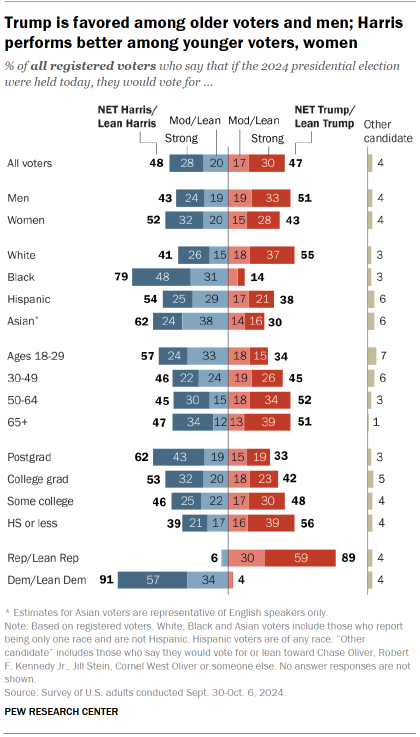
The current snapshot of how all registered voters view the race shows Harris and Trump in a virtual tie: 48% say they would vote for or lean toward Harris if the election were held today, while 47% say they would support Trump.
The underlying pattern in voting preferences mirrors those from last month: Harris is preferred among younger voters, Black voters and those with a college degree while Trump is favored among older voters, White voters and men.
Gender
Men are more likely to prefer Trump than Harris, while women favor Harris by a similar margin.
Race and ethnicity
More White voters prefer Trump to Harris (55% to 41%), while Black voters overwhelmingly back Harris (79% vs. 14%). Among all registered Hispanic voters, roughly half (54%) support Harris, while a smaller share (38%) support Trump. And Asian voters back Harris over Trump by two-to-one (62% vs. 30%).
Education
Registered voters without a four-year college degree back Trump over Harris (52% vs. 42%). The reverse is true for registered voters with a college degree (57% Harris vs. 38% Trump).
Age
Voters under 50 are more likely to prefer Harris over Trump (50% vs. 41%) while those ages 50 and older prefer Trump (52% vs. 46%). Voters under 50 are more likely to say they would support a candidate other than Harris or Trump (7%) than are those 50 and older (2%).
For more on voting preferences among registered voters, refer to the detailed tables.
2020 turnout and support for Harris and Trump
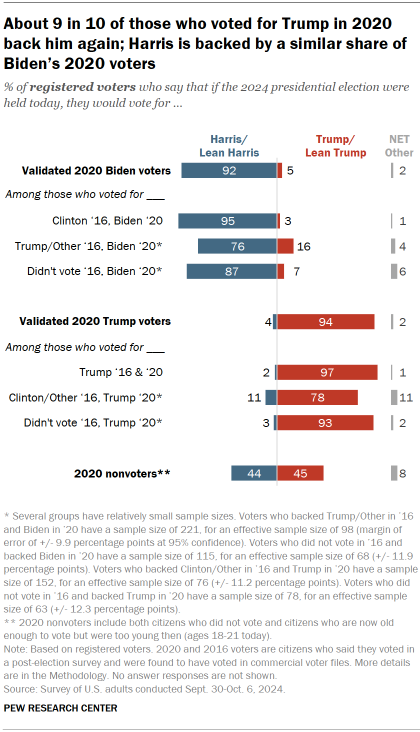
Trump has held onto most of his supporters from 2020 (94% say they support him this year). And Harris receives a similar level of support from President Joe Biden’s 2020 voters (92% support her).
Just 5% of voters who backed Biden four years ago say they now support Trump, while 4% of voters who cast ballots for Trump last time now back Harris.
Voters who did not vote in 2020 – either because they chose not to or were too young – are split about evenly between Trump (45%) and Harris (44%), while 8% say they back a third-party candidate.
2020 Trump voters
Trump’s support is strongest among voters who backed him in both 2016 and 2020 (97%) and among those who did not vote in 2016 but turned out for him four years ago (93%).
Most voters who switched from Clinton or another candidate in 2016 to Trump in 2020 continue to support Trump (78% back him now), but their support is lower than among his other 2020 voters. About one-in-ten of these voters (11%) say they support a third-party candidate, while an identical share supports Harris.
2020 Biden voters
Support for Harris among Biden’s 2020 voters follows a similar pattern: 95% of voters who voted for Clinton in 2016 and Biden in 2020 say they support Harris, and 87% of those who did not vote in 2016 but cast a ballot for Biden in 2020 now support Harris.
About three-quarters of Biden’s 2020 voters who backed Trump or another candidate in 2016 are with Harris this year (76%), while 16% say they support Trump and 4% support a third-party candidate.
Harris and Trump supporters’ views of their vote
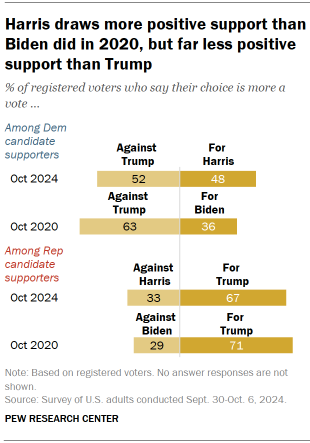
Harris’ supporters are more likely than Biden’s supporters were four years ago to view their vote as more of a vote for their candidate rather than a vote against Trump. About half of Harris supporters (48%) say they view their vote as a ballot for her. In 2020, 36% of Biden supporters said this about their vote for him.
The share of Democratic candidate supporters who say they are voting against Trump is down from 63% in 2020 to 52% today.
As in 2020, most Trump supporters say they are primarily voting for him rather than against his Democratic opponent. Two-thirds of Trump backers say they view their vote as a vote for him, while a third say their vote is against Harris.
Voter engagement and interest
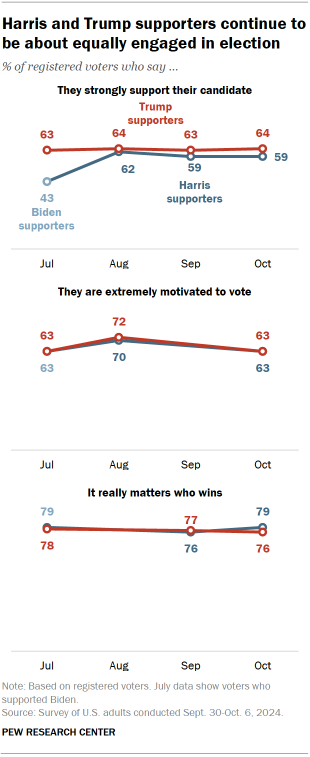
Supporters of both Harris and Trump are about equally engaged with the election across three measures of interest in the campaign and voting. As was the case ahead of the 2020 presidential election, neither side has a clear advantage in voter engagement.
Yet voters overall report being less motivated to vote than at a similar point in 2020.
Strength of support
Trump (64%) holds a slight edge over Harris (59%) in the share of voters who say they strongly support their candidate, but his advantage over Harris is significantly narrower now (5 percentage points) than what it was over Biden in July (20 points).
Motivation to vote
Equal shares of Harris and Trump supporters say they are extremely motivated to vote (63% each).
Motivation to turn out to vote has decreased modestly since August, when 72% of Trump supporters and 70% of Harris supporters said they were extremely motivated to vote.
‘Really matters’ who wins
About eight-in-ten Harris supporters (79%) and nearly as many Trump supporters (76%) say the outcome of the election really matters.
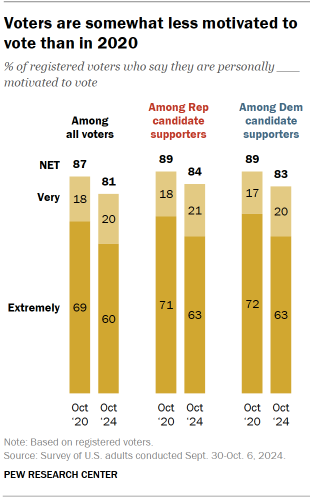
Voters are somewhat less likely to say they are highly motivated to vote than in October 2020. Today, 81% of voters say they are extremely or very motivated to vote, 6 points lower than the share of voters who said this at a similar point in the 2020 campaign. The share who are extremely motivated is down from 69% in 2020 to 60% today.
Supporters of both candidates are now less motivated to vote than four years ago. About six-in-ten Trump supporters (63%) are extremely motivated to vote, which is down from 71% in October of 2020. Similarly, while 63% of Harris supporters say they are extremely motivated, that is down from the 72% of Biden’s supporters who said this in October of 2020.
Motivation to vote across key demographic groups
Overall, six-in-ten registered voters say they are extremely motivated to vote this year. But, as in past elections, there are some significant demographic differences in the shares expressing motivation to vote.
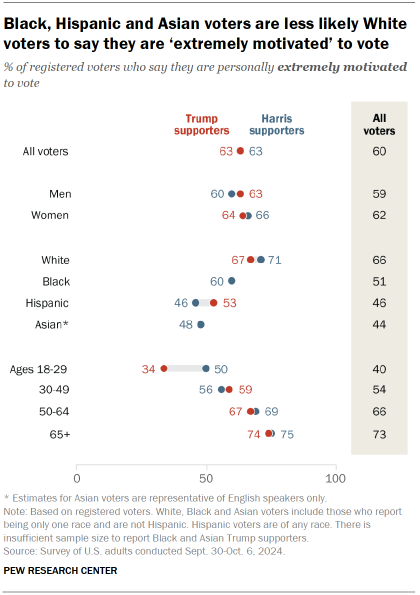
Among registered voters, men (59%) and women (62%) are about equally likely to say they are extremely motivated to vote. Women voters who support Harris (66%) are modestly more motivated than men who support the vice president (60%).
There are wide differences in motivation across racial and ethnic groups.
- 66% of White voters are extremely motivated to vote.
- 51% of Black voters are extremely motivated.
- 46% of Hispanic voters are extremely motivated.
- 44% of Asian voters are extremely motivated.
Motivation to vote increases with age: Today, 73% of voters ages 65 and older say they are extremely motivated to vote, compared with 66% of voters 50 to 64 and 54% of voters 30 to 49.
As in 2020, voters under age 30 are the least likely to say they are motivated to vote: 40% of voters in this age group say they are extremely motivated to vote. And Trump supporters under 30 are less likely than young Harris backers to be highly motivated to vote (34% to 50%, respectively).




